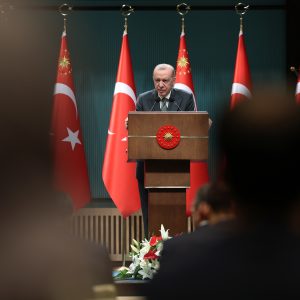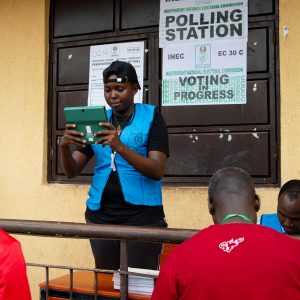Indonesia’s Prabowo Subianto wins presidency with first-round majority
Jakarta, Indonesia – AFP
Indonesia’s Prabowo Subianto has been elected as president of the world’s third-biggest democracy, the elections commission said Wednesday, beating two rivals who have vowed to file a legal complaint about the vote.
The fiery defence minister and his vice-presidential running mate Gibran Rakabuming Raka — the eldest son of outgoing leader Joko Widodo — had already declared victory last month after unofficial counts showed them winning a majority.
They were officially confirmed as the winners on Wednesday after receiving more than 96 million votes, commission chairman Hasyim Asy’ari said, roughly 58.6 percent of the total count and enough to secure a first-round majority.
Anies Baswedan secured nearly 41 million votes, or 24.9 percent of the total count, while Ganjar Pranowo received 27 million votes, more than 16 percent.
More than 164 million Indonesians voted, the commission said, representing around an 80 percent turnout of over 204 million eligible voters.
Prabowo, 72, was widely predicted to win the presidency on his third attempt. He will take over the presidency in October after a transition period.
His popularity soared because of what experts said was his nationalist verve in populist speeches, strongman credentials as defence minister and backing from Widodo, more popularly known as Jokowi.
US Secretary of State Antony Blinken was quick to congratulate Prabowo, saying Washington looked “forward to partnering closely” with the ex-general, who was once placed on a US visa blacklist.
“We extend our sincere congratulations to Indonesian President-elect Prabowo Subianto on his victory,” he said in a statement.
Prabowo’s rivals former Jakarta governor Anies and former Central Java governor Ganjar have vowed to submit a complaint to the Constitutional Court about allegations of irregularities and fraud during the election.
They have three days to submit complaints from Wednesday.
But Prabowo’s legal team is confident the result will not be successfully challenged because of his majority and wide margin of victory, local media reported Tuesday.
– ‘X factor’ –
Last month Indonesia held one of the world’s biggest one-day elections featuring more than 164 million voters and hundreds of thousands of candidates vying for the presidency, parliamentary seats and local legislator positions.
After failing as a vice-presidential candidate in 2009 and presidential candidate in 2014 and 2019, Prabowo rode to victory this time with Jokowi’s support.
The campaign was punctuated by accusations of ethical violations and interference by Jokowi, who critics said manoeuvered to install a political dynasty through his son before leaving office.
“Jokowi is the X factor that heavily influenced Prabowo’s victory,” said Firman Noor, politics professor at the National Research and Innovation Agency (BRIN).
Observers also accused Jokowi of unlocking swathes of social funds in the run-up to the election to sway rural voters in Prabowo’s favour.
He has also tried to please Prabowo, experts say, by making him an honorary four-star general despite allegations of misconduct while he was in the army as the outgoing leader bids to keep his influence under the new administration.
– Democracy fears –
Indonesia’s next president has also weathered allegations from rights groups and his former bosses that he played a role in the disappearance of student activists in the late 1990s at the end of dictator Suharto’s rule.
In 1997 and 1998, when some kidnappings took place, Subianto led the elite army force known as Kopassus, used by Jakarta for special operations aimed at tamping down internal unrest. More than a dozen activists were never found.
He was discharged from the military over the kidnappings but has denied direct responsibility and the accusations appeared to have little impact on his electoral hopes this time.
Prabowo will inherit Southeast Asia’s largest economy, which is enjoying around five percent growth annually.
There is voter optimism about the economy with Prabowo’s pledge to carry on Jokowi’s resource nationalism that seeks to turn Indonesia into a global nickel powerhouse.
Others are less sure about the security of the country’s young democracy, which emerged from decades of autocratic rule in the late 1990s in which Prabowo played a part.
“I see the future of democracy becoming even bleaker during Prabowo’s time,” said Hurriyah, director of the University of Indonesia’s Center for Political Studies.











